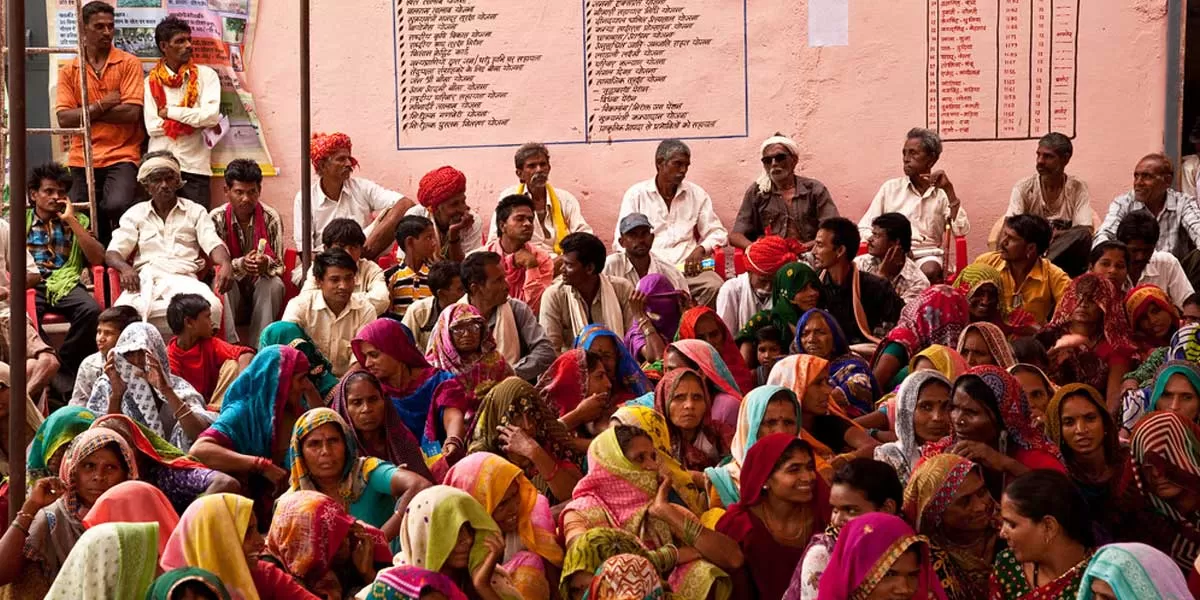The Ministry of Panchayati Raj organised the National Convention on Model Women-Friendly Gram Panchayats in New Delhi on 5th March 2025, marking a significant step towards gender-inclusive governance at the grassroots level. The initiative aims to establish one Model Gram Panchayat per district across India, creating local governance units that are women- and girl-friendly. The convention, held as part of the International Women’s Day 2025 celebrations, brought together over 1,500 elected representatives and officials from Gram Panchayats nationwide in both physical and virtual formats.
The event was graced by Union Ministers of State Smt. Anupriya Patel (Health & Family Welfare) and Prof. S.P. Singh Baghel (Panchayati Raj), alongside senior officials including Shri Vivek Bharadwaj (Secretary, Ministry of Panchayati Raj) and Shri Sushil Kumar Lohani (Additional Secretary). Representatives from various government ministries, State Institutes of Rural Development & Panchayati Raj (SIRD&PRs), and international organisations, including the United Nations Population Fund (UNFPA), also participated.
A key highlight of the convention was the launch of a Real-Time Monitoring Dashboard, a technological intervention designed to track, analyse, and improve women’s participation in local governance. This platform provides data-driven insights to support women leaders and assess the progress of women-friendly Gram Panchayats. The dashboard is expected to enhance transparency and facilitate targeted interventions in rural development.
In her address, Smt. Anupriya Patel underscored the pivotal role of women elected representatives in ensuring that government schemes reach the most vulnerable communities. She highlighted key health initiatives such as:
Ayushman Aarogya Mandir, offering 12 essential medical services, including geriatric care, dental care, disease screening, and telemedicine.
Janani Suraksha Yojana and Janani Shishu Suraksha Karyakram, which promote institutional deliveries and maternal healthcare.
Village Health, Sanitation, and Nutrition Committees, operating in every Gram Panchayat, to strengthen community health initiatives.
She urged women Pradhans to educate their communities about these schemes, ensuring that maximum beneficiaries avail of government health provisions.
Prof. S.P. Singh Baghel announced the selection of 770 Model Women-Friendly Gram Panchayats, one per district, for specialised leadership training. He encouraged women Sarpanchs to lead the implementation of central government welfare schemes, including:
Pradhan Mantri Jeevan Jyoti Bima Yojana and Pradhan Mantri Suraksha Bima Yojana for financial security.
Pension schemes for widows and divyangjan (persons with disabilities).
Ayushman Bharat for universal healthcare access.
Organ donation awareness initiatives.
Strengthening Gender-Inclusive Governance
Shri Vivek Bharadwaj, Secretary of the Ministry of Panchayati Raj, emphasised that the Model Women-Friendly Gram Panchayat initiative is a transformative intervention, aiming to advance women's participation in governance, leadership, and decision-making. He called for stronger support systems within Panchayats to help women realise their full potential in nation-building.
Dr Deepa Prasad, Chief of Programmes, UNFPA, highlighted successful regional governance models such as:
Kerala’s Jagratha Samithi, a vigilance committee dedicated to protecting women and children.
Odisha’s community-led interventions aimed at preventing child marriage and social injustices.
UNFPA’s collaboration with Rajasthan Panchayati Raj Department to develop women- and child-friendly Gram Panchayats.
The National Convention marks a shift from women-centric development to women-led governance, reflecting India's progress in gender equity over the past decade. A major milestone in this journey has been the enactment of the Women's Reservation Bill (Nari Shakti Vandan Adhiniyam), ensuring greater women’s representation in policymaking.
To further this vision, a nationwide Mahila Gram Sabha will be held on 8th March 2025, providing a dedicated platform for discussions on women’s empowerment, rural development, and gender-sensitive governance reforms.
Market and Industry Outlook
The growing emphasis on women-led governance and grassroots empowerment is set to drive a new wave of socio-economic transformation in rural India. With increased government focus on gender-responsive budgeting, inclusive policies, and digital governance, India’s Panchayati Raj framework is evolving towards data-driven and technology-enabled administration. The Real-Time Monitoring Dashboard is a significant innovation, aligning with global best practices in measuring policy impact. As corporates and international organisations increasingly invest in rural development and women’s entrepreneurship, the Model Women-Friendly Gram Panchayat initiative is expected to serve as a catalyst for inclusive growth and sustainable rural transformation.





















